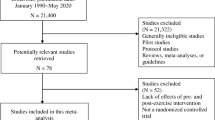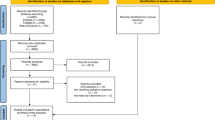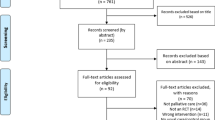Abstract
Purpose
Aerobic exercise improves prognosis and quality of life (QoL) following completion of chemotherapy. However, the safety and efficacy of aerobic exercise during chemotherapy is less certain. A systematic review was performed of randomised trials of adult patients undergoing chemotherapy, comparing an exercise intervention with standard care.
Method
From 253 abstracts screened, 33 unique trials were appraised in accordance with PRISMA guidance, including 3257 patients. Interventions included walking, jogging or cycling, and 23 were of moderate intensity (50–80% maximum heart rate).
Results
Aerobic exercise improved, or at least maintained fitness during chemotherapy. Moderately intense exercise, up to 70–80% of maximum heart rate, was safe. Any reported adverse effects of exercise were mild and self-limiting, but reporting was inconsistent. Adherence was good (median 72%). Exercise improved QoL and physical functioning, with earlier return to work. Two out of four studies reported improved chemotherapy completion rates. Four out of six studies reported reduced chemotherapy toxicity. There was no evidence that exercise reduced myelosuppression or improved response rate or survival.
Conclusions
Exercise during chemotherapy is safe and should be encouraged because of beneficial effects on QoL and physical functioning. More research is required to determine the impact on chemotherapy completion rates and prognosis.


Similar content being viewed by others
References
Brown JC, Winters-Stone K, Lee A, Schmitz KH (2012) Cancer, physical activity, and exercise. Compr Physiol 2(4):2775–2809
Schmitz KH, Courneya KS, Matthews C et al (2010) American College of Sports Medicine roundtable on exercise guidelines for cancer survivors. MedSci Sports Exerc 42(7):1409–1426
McCullough DJ, Stabley JN, Siemann DW et al. (2014) Modulation of blood flow, hypoxia, and vascular function in orthotopic prostate tumors during exercise. J Natl Cancer Inst. 106(4)
McNeely ML, Campbell KL, Rowe BH et al (2006) Effects of exercise on breast cancer patients and survivors: a systematic review and meta-analysis. CMAJ. 175(1):34–41
Thorsen L, Courneya KS, Stevinson C et al (2008) A systematic review of physical activity in prostate cancer survivors: outcomes, prevalence and determinants. Support Care Cancer. 16(9):987–997
Schmid D, Leitzmann MF (2014) Association between physical activity and mortality among breast cancer and colorectal cancer survivors: a systematic review and meta-analysis. Ann Oncol 25(7):1293–1311. https://doi.org/10.1093/annonc/mdu012
Macmillan Cancer Support. Maintaining a healthy lifestyle. Available at: http://www.macmillan.org.uk/information-and-support/coping/maintaining-a-healthy-lifestyle/keeping-active
Mishra SI, Scherer RW, Snyder C et al (2014) Are exercise programs effective for improving health-related quality of life among cancer survivors? A systematic review and meta-analysis. OncolNurs Forum. 41(6):E326–E342
Tomlinson D, Diorio C, Beyene J et al (2014) Effect of exercise on cancer-related fatigue: a meta-analysis. Am J Phys Med Rehabil. 93(8):675–686
Puetz TW, Herring MP (2012) Differential effects of exercise on cancer-related fatigue during and following treatment: a meta-analysis. Am J Prev Med. 43(2):e1–e24
Kleckner I, Kamen CS, Peppone LJ et al. (2016) A URCC NCORP nationwide randomized controlled trial investigating the effect of exercise on chemotherapy-induced peripheral neuropathy in 314 cancer patients. JClinOncol 34
van Waart H, Stuiver MM, van Harten WH et al (2015) Effect of low-intensity physical activity and moderate- to high-intensity physical exercise during adjuvant chemotherapy on physical fitness, fatigue, and chemotherapy completion rates: results of the PACES Randomized Clinical Trial. JClinOncol 33(17):1918–1927
Sturgeon K, Schadler K, Muthukumaran G et al (2014) Concomitant low-dose doxorubicin treatment and exercise. Am J PhysiolRegulIntegr Comp Physiol. 307(6):R685–R692
Higgins, JPT, Green S (editors) (2011) Cochrane Handbook for Systematic Reviews of Interventions Version 5.1.0 [updated 2011]. The Cochrane Collaboration, 2011. Available from www.handbook.cochrane.org
Schmidt T, Weisser B, Dürkop J et al. Comparing endurance and resistance training with standard care during chemotherapy for patients with primary breast cancer. Anticancer Res 2015;35(10):5623–5629
Travier N, Velthuis MJ, Steins Bisschop CN et al (2015) Effects of an 18-week exercise programme started early during breast cancer treatment: a randomised controlled trial. BMC Med. 13:121
Al-Majid S, Wilson LD, Rakovski C et al (2015) Effects of exercise on biobehavioral outcomes of fatigue during cancer treatment: results of a feasibility study. Biol Res Nurs. 17(1):40–48
Courneya KS, Segal RJ, McKenzie DC et al (2014) Effects of exercise during adjuvant chemotherapy on breast cancer outcomes. Med Sci Sports Exerc. 46(9):1744–1751
Husebø AML, Dyrstad SM, Mjaaland I et al (2014) Effects of scheduled exercise on cancer-related fatigue in women with early breast cancer. Sci World J 2014(271828):1–9
Hornsby WE, Douglas PS, West MJ et al (2014) Safety and efficacy of aerobic training in operable breast cancer patients receiving neoadjuvant chemotherapy: a phase II randomized trial. ActaOncol 53(1):65–74
Phillips KM, Jim HS, Small BJ et al (2012) Effects of self-directed stress management training and home-based exercise on stress management skills in cancer patients receiving chemotherapy. Stress Health 28(5):368–375
Yang CY, Tsai JC, Huang YC et al (2011) Effects of a home-based walking program on perceived symptom and mood status in postoperative breast cancer women receiving adjuvant chemotherapy. JAdvNurs 67(1):158–168
Adamsen L, Quist M, Andersen C et al (2009) Effect of a multimodal high intensity exercise intervention in cancer patients undergoing chemotherapy: randomised controlled trial. BMJ 339:b3410
Swenson KK, Nissen MJ, Anderson E et al (2009) Effects of exercise vs bisphosphonates on bone mineral density in breast cancer patients receiving chemotherapy. J Support Oncol. 7(3):101–107
Campbell A, Mutrie N, White F et al (2005) A pilot study of a supervised group exercise programme as a rehabilitation treatment for women with breast cancer receiving adjuvant treatment. Eur J OncolNurs 9(1):56–63
Mock V, Frangakis C, Davidson NE et al (2005) Exercise manages fatigue during breast cancer treatment: a randomized controlled trial. Psychooncology 14(6):464–477
Mock V, Burke MB, Sheehan P et al (1994) A nursing rehabilitation program for women with breast cancer receiving adjuvant chemotherapy. OncolNurs Forum 21(5):899–907
Backman M, Wengström Y, Johansson B et al (2014) A randomized pilot study with daily walking during adjuvant chemotherapy for patients with breast and colorectal cancer. ActaOncol 53(4):510–520
Henke CC, Cabri J, Fricke L et al (2014) Strength and endurance training in the treatment of lung cancer patients in stages IIIA/IIIB/IV. Support Care Cancer 22(1):95–101
Anderson RT, Kimmick GG, McCoy TP et al (2012) A randomized trial of exercise on well-being and function following breast cancer surgery: the RESTORE trial. J Cancer Surviv 6(2):172–181
Haines TP, Sinnamon P, Wetzig NG et al (2010) Multimodal exercise improves quality of life of women being treated for breast cancer, but at what cost? Randomized trial with economic evaluation. Breast Cancer Res Treat 124(1):163–175
Dodd MJ, Cho MH, Miaskowski C et al (2010) A randomized controlled trial of home-based exercise for cancer-related fatigue in women during and after chemotherapy with or without radiation therapy. Cancer Nurs 33(4):245–257
Battaglini CL, Mihalik JP, Bottaro M et al (2008) Effect of exercise on the caloric intake of breast cancer patients undergoing treatment. Braz J Med Biol Res 41(8):709–715
Headley JA, Ownby KK, John LD et al (2004) The effect of seated exercise on fatigue and quality of life in women with advanced breast cancer. OncolNurs Forum 31(5):977–983
Pickett M, Mock V, Ropka ME et al (2002) Adherence to moderate-intensity exercise during breast cancer therapy. Cancer Pract 10(6):284–292
Segal R, Evans W, Johnson D et al (2001) Structured exercise improves physical functioning in women with stages I and II breast cancer: results of a randomized controlled trial. J Clin Oncol 19(3):657–665
Choi JY, Kang HS (2012) Effects of a home-based exercise program for patients with stomach cancer receiving oral chemotherapy after surgery. J Korean AcadNurs 42(1):95–104
Moros MT, Ruidiaz M, Caballero A et al (2010) Effects of an exercise training program on the quality of life of women with breast cancer on chemotherapy. Rev Med Chil 138(6):715–722
Oechsle K, Aslan Z, Suesse Y et al (2014) Multimodal exercise training during myeloablative chemotherapy: a prospective randomized pilot trial. Support Care Cancer 22(1):63–69
Coleman EA, Goodwin JA, Kennedy R et al (2012) Effects of exercise on fatigue, sleep, and performance: a randomized trial. OncolNurs Forum. 39(5):468–477
Courneya KS, Sellar CM, Stevinson C et al (2009) Randomized controlled trial of the effects of aerobic exercise on physical functioning and quality of life in lymphoma patients. J Clin Oncol 27(27):4605–4612
Dimeo FC, Stieglitz RD, Novelli-Fischer U et al (1999) Effects of physical activity on the fatigue and psychologic status of cancer patients during chemotherapy. Cancer 85(10):2273–2277
Dimeo F, Fetscher S, Lange W et al (1997) Effects of aerobic exercise on the physical performance and incidence of treatment-related complications after high-dose chemotherapy. Blood. 90(9):3390–3394
Baumann FT, Kraut L, Schüle K et al (2010) A controlled randomized study examining the effects of exercise therapy on patients undergoing haematopoietic stem cell transplantation. Bone Marrow Transplant 45(2):355–362
De For TE, Burns LJ, Gold EM et al (2007) A randomized trial of the effect of a walking regimen on the functional status of 100 adult allogeneic donor hematopoietic cell transplant patients. Biol Blood Marrow Transplant 13(8):948–955
Jarden M, Baadsgaard MT, Hovgaard DJ et al (2009) A randomized trial on the effect of a multimodal intervention on physical capacity, functional performance and quality of life in adult patients undergoing allogeneic SCT. BMT 43:725–737
Courneya KS, Segal RJ, Mackey JR et al (2007) Effects of aerobic and resistance exercise in breast cancer patients receiving adjuvant chemotherapy: a multicenter randomized controlled trial. JClinOncol 25(28):4396–4404
Jones LW, Fels DR, West M et al (2013) Modulation of circulating angiogenic factors and tumor biology by aerobic training in breast cancer patients receiving neoadjuvant. chemotherapy. 6(9):925–937
Betof AS, Dewhirst MW, Jones LW (2013) Effects and potential mechanisms of exercise training on cancer progression: a translational perspective. Brain Behav Immun 30(0):S75–S87
Acknowledgments and declarations of contribution
JC and CYH performed the search and data extraction. AP wrote the first draft of the text. All authors contributed to review of the extracted data and drafting the final version of the manuscript.
We would like to acknowledge Celia Diez De Los Rios De La Serna for Spanish translation and Michael Ahn for Korean translation. Also, Mr. Stephen Kerr Royal College of Surgeons Edinburgh for performing the searches.
Author information
Authors and Affiliations
Corresponding author
Ethics declarations
Conflict of interest
JC has received payment to her institution as research funding from Boehringer Ingelheim. MW has received payment to his institution as grant funding from National Institute of Health Research. MG has received payment to his institution for board membership from Sphere Medical Ltd., for consultancy from Duke University Medical Centre, and as unrestricted grants from Sphere Medical Ltd. and Pharmacosmos Ltd. MG has received honoraria and lecture payments from Edwards Lifesciences.
Rights and permissions
About this article
Cite this article
Cave, J., Paschalis, A., Huang, C.Y. et al. A systematic review of the safety and efficacy of aerobic exercise during cytotoxic chemotherapy treatment. Support Care Cancer 26, 3337–3351 (2018). https://doi.org/10.1007/s00520-018-4295-x
Received:
Accepted:
Published:
Issue Date:
DOI: https://doi.org/10.1007/s00520-018-4295-x




